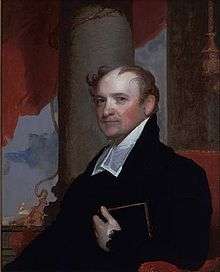John Thornton Kirkland
John Thornton Kirkland (August 17, 1770 – April 26, 1840) served as President of Harvard University from 1810 to 1828. As an undergraduate, he was a member of the Hasty Pudding. A religious minister like many of his predecessors, he is remembered chiefly for his lenient treatment of students. Kirkland House, one of Harvard's undergraduate "houses," or residence halls, was named in his honor.
John Thornton Kirkland | |
|---|---|
 Portrait by Gilbert Stuart, circa 1816 | |
| 15th President of Harvard University | |
| In office 1810–1828 | |
| Preceded by | Samuel Webber |
| Succeeded by | Josiah Quincy III |
| Personal details | |
| Born | August 17, 1770 Herkimer County, New York |
| Died | April 26, 1840 (aged 69) Boston, Massachusetts |
Oliver Wendell Holmes describes him thus, in his study of Ralph Waldo Emerson: "His 'shining morning face' was round as a baby's, and talked as pleasantly as his voice did, with smiles for accents and dimples for punctuation.... It was of him that the story was always told,--it may be as old as the invention of printing,--that he threw his sermons into a barrel, where they went to pieces and got mixed up, and that when he was going to preach he fished out what he thought would be about enough for a sermon, and patched the leaves together as he best might."
His contemporary George Ticknor described Kirkland's sermons as "full of intellectual wealth and practical wisdom, with sometimes a quaintness that bordered on humor."
Kirkland served as pastor of the New South Church in Boston, 1794–1810. He was elected a Fellow of the American Academy of Arts and Sciences in 1799.[1] Kirkland was a founding member of the American Antiquarian Society in 1812.[2] His wife Elizabeth Cabot was the daughter of Congressman George Cabot.
References
- "Book of Members, 1780–2010: Chapter K" (PDF). American Academy of Arts and Sciences. Retrieved September 8, 2016.
- American Antiquarian Society Members Directory
External links
| Academic offices | ||
|---|---|---|
| Preceded by Samuel Webber |
President of Harvard University 1810–1828 |
Succeeded by Josiah Quincy III |